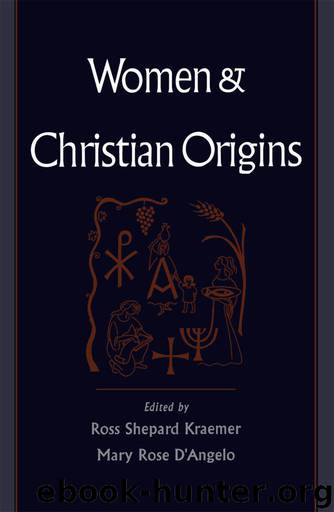Women and Christian Origins by Kraemer; D'Angelo Mary Rose;

Author:Kraemer; D'Angelo, Mary Rose;
Language: eng
Format: epub
Publisher: Oxford University Press, Incorporated
Published: 2015-03-19T16:00:00+00:00
Philippians: Euodia and Syntyche
Missionary couples in the Pauline churches were not always a man and a woman. Women sometimes worked together as missionary partners.13 Phil 4:2–3 offers a window into the importance of the roles of female missionary partners in the Philippian community, but probably also to the expansion of the broader Pauline mission (cf. Rom 16:12). Euodia and Syntyche are urged “to be of the same mind in the Lord.” Most commentators have seen here a reference to a conflict between the two women, but it is also possible that the conflict is between the apostle and the two women. In either case, Paul calls on a third party to mediate (Phil 4:3). Settlement of the dispute that involves these two women is vital because they have struggled beside Paul in the work of the gospel, together with Clement and his other coworkers.
We do not know the details of the dispute involving these two women, but the fact that Paul’s response is so strong in Phil 4:2–3 and that the need to encourage unity appears consistently as a community concern (e.g., Phil 1:27) suggests that the issues were central to the purpose of the letter.14 Philippians was written while Paul was in prison, probably either in Ephesus (55–56 CE) or Rome (58–60 CE). In this letter, Paul’s reliance on coworkers stands out especially clearly; leadership was exercised within a communal framework. When a missionary team experiences difficulty, the community is called on to offer support.
With Euodia and Syntyche, we encounter indisputable evidence of women acting as leaders without male counterparts. It is also important to note that the manner in which Paul describes these women as participating with him in the work of the gospel implies that they were involved in the evangelizing of nonbelievers. They may have sometimes acted out their leadership in an established “house-church” community, but their ministry extended into the world outside. In the discussion of Prisca above, we saw how the household setting of early Christianity may have facilitated women’s leadership. The information revealed about Euodia and Syntyche in Phil 4:2–3 indicates that the domestic character of early Christianity cannot completely explain the nature of women’s involvement in the Pauline churches. By being involved in the evangelizing of nonbelievers, Euodia and Syntyche were engaging in activities that extended beyond a local house-church in an effort to expand the network of such household cells throughout the Greco-Roman world. They were actively involved in a mission that sought to win both Jew and Gentile—a mission that was pushing outward toward the west in the hope of transforming the world (cf. Rom 15:19, 15: 23–24). Moreover, Euodia and Syntyche were part of a movement that seems to have combined aspects of the life of public institutions with aspects of the domestic realm. The Greek term ekklesia, typically used to designate the community in Paul’s letters means gathering and is usually translated as “church.” In both Jewish usage and elsewhere, it refers to a formal assembly of citizens; the term clearly has “public” connotations.
Download
This site does not store any files on its server. We only index and link to content provided by other sites. Please contact the content providers to delete copyright contents if any and email us, we'll remove relevant links or contents immediately.
The Lost Art of Listening by Michael P. Nichols(7270)
Why I Am Not A Calvinist by Dr. Peter S. Ruckman(4064)
The Rosicrucians by Christopher McIntosh(3414)
Wicca: a guide for the solitary practitioner by Scott Cunningham(3077)
Signature in the Cell: DNA and the Evidence for Intelligent Design by Stephen C. Meyer(2931)
Real Sex by Lauren F. Winner(2909)
The Holy Spirit by Billy Graham(2812)
To Light a Sacred Flame by Silver RavenWolf(2712)
The End of Faith by Sam Harris(2650)
The Gnostic Gospels by Pagels Elaine(2420)
Waking Up by Sam Harris(2347)
Nine Parts of Desire by Geraldine Brooks(2291)
Jesus by Paul Johnson(2252)
Devil, The by Almond Philip C(2230)
The God delusion by Richard Dawkins(2205)
Heavens on Earth by Michael Shermer(2203)
Kundalini by Gopi Krishna(2107)
Chosen by God by R. C. Sproul(2073)
The Nature of Consciousness by Rupert Spira(1997)
